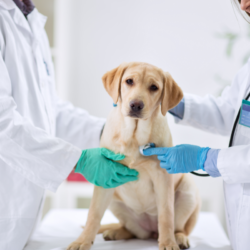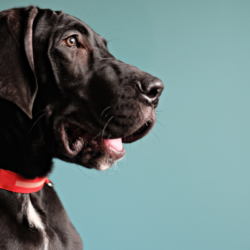We’ve all experienced those affectionate moments with our four-legged friends, only to be surprised by a foul odour coming from their mouths. Your dog’s bad breath can be more than just a nuisance, it can be a sign of an underlying healthproblem. Fortunately, there are a variety of natural solutions you can try to improve your dog’s breath.
My dog has bad breath, what are the natural solutions?
This frequently asked question is a sign that you are not alone in this struggle. Understanding why your dog has bad breath is the first step to solving the problem.
Understanding bad breath in dogs
In short, bad breath, or halitosis, in dogs is not something to be taken lightly. It’s essential to understand that bad breath can be an indicator of health problems that go far beyond a simple olfactory annoyance. This unpleasant smell can be a symptom of a variety of problems, from poor oral hygiene to digestiveproblems, infections or more serious illnesses.
Dietary factors leading to bad breath
Diet is one of the key factors contributing to your dog’s bad breath. A diet consisting mainly of processed foods, high-protein foods or poor-quality products can lead to bad breath. In addition, specific foods, such as fish or high-fat foods, are known to cause unpleasant breath.
Our dogs’ oral health is closely linked to their diet. To combat bad breath effectively, it’s essential to choose natural, beneficial foods.
- Crunchy raw vegetables: Vegetables such as carrots or apples can act as a natural cleaner for teeth. Their crunchy texture helps to reduce tartar and massage the gums.
- Fibre-rich foods: Fibre, found in green vegetables such as spinach, promotes good digestion and helps cleanse the digestive system. Good digestive health is crucial in preventing bad breath.
- Natural food supplements: Spirulina, a nutrient-rich algae, can be an excellent supplement for neutralising unpleasant odours. It contains minerals and vitamins that boost the immune system and oral health.
- Avoid harmful foods: Certain foods rich in sugar or fat can aggravate bad breath. It is therefore advisable to avoid them in your dog’s daily diet:
- Foods high in sugar: Sweet treats, even those specifically designed for dogs, can contribute to the formation of plaque and tartar. It’s best to limit their consumption.
- Fatty foods: Foods that are too fatty, particularly certain meats or industrial snacks, can be difficult to digest, affecting breath quality. Choose lean protein sources instead.
- Processed foods and preservatives: Processed foods containing preservatives, colourings and other chemical additives can unbalance your dog’s oral and intestinal flora, leading to breath problems.
- Homemade Treat Recipes: Preparing homemade treats using natural ingredients such as pumpkin, parsley or mint can be a tasty and healthy way to maintain fresh breath.
Dental hygiene and bad breath
Another major factor in bad breath in dogs is poor dental hygiene. As in humans, plaque and tartar build-up on the teeth can lead to bad breath. These accumulations are the ideal breeding ground for bacteria, which can then produce foul-smelling gases.
Health problems linked to bad breath
In some cases, bad breath can be a sign of more serious health problems. Certain illnesses, such as diabetes, kidney disease or liver problems, can cause bad breath. If you’ve tried various solutions to improve your dog’s breath without success, it’s advisable to consult a vet to rule out these potential health problems.
Natural remedies for bad breath in dogs
Fortunately, there are many natural solutions to combat your dog’s bad breath. Here are some of the most effective methods.
Change your diet to combat bad breath
The importance of a quality diet cannot be underestimated when it comes to your dog’s general health and well-being, including the quality of its breath. The composition of your dog’s diet can have a direct impact on the presence of bad breath. By changing your dog’s diet, you can reduce the risk of developing oral problems and improve his breath.
Opt for a better quality food
Choosing a high-quality food for your dog is crucial to his overall health. A diet rich in qualityproteins, fresh fruit and vegetables and complete carbohydrates can contribute to better dental health and fresher breath. Avoid poor quality dog foods that contain by-products, fillers and artificial preservatives, as these can be difficult to digest and can contribute to bad breath.
Include naturally cleansing foods
Including crunchy vegetables such as carrots or apples in your dog’s diet can help clean teeth naturally. These foods work like natural toothbrushes, helping to remove plaque and improve breath. Apples, in particular, contain malic acid, which helps to freshen breath and whiten teeth.
Consider raw food
Raw feeding, also known as the BARF(Biologically Appropriate Raw Food) diet, is another option to consider for improving your dog’s breath. This diet consists mainly of raw meats,bones, fruit and vegetables. Not only does it promote better dental health by helping to remove plaque, it can also improve digestion and reduce unpleasant odours.
Points to consider
It’s important to note that a change of diet should be made gradually to avoid digestive problems. Start by introducing the new food slowly, while reducing the amount of the old food. What’s more, every dog is unique and what works for one dog may not work for another. So it’s vital to work closely with your vet. To work out a meal plan that’s right for your dog.
Natural dental care to combat bad breath
Dental hygiene is essential for preventing bad breath in dogs. Brushing your dog’s teeth regularly with a toothpaste specially designed for dogs can make a big difference. You could also consider investing in dental toys or treats specially designed to help clean your dog’s teeth.
Using herbs to combat bad breath
Certain herbs can be beneficial in combating your dog’s bad breath. Parsley is one of the best-known natural remedies for bad breath. You can add a little chopped parsley to your dog’s food to help freshen his breath.
Probiotics to combat this problem
Using probiotics to combat bad breath in dogs is a promising and natural approach. Probiotics, commonly known as ‘ good bacteria ‘, play an essential role in maintaining a healthy, balanced intestinal ecosystem, which can indirectly help improve your dog’s breath.
Understanding the role of probiotics
Probiotics are living micro-organisms, mainly bacteria, that are beneficial to the overall health of the host when consumed in adequate quantities. They help maintain the balance of the intestinal microbiota, i.e. the community of micro-organisms living in the intestine.
Probiotics help prevent the overgrowth of harmful bacteria, promote healthy digestion and strengthen the immune system. A healthy intestinal flora can also help reduce unpleasant odours emanating from the body, including bad breath.
Choosing probiotics for your dog
There are many probiotic supplements available on the market. However, not all of them are suitable or beneficial for your dog. It’s essential to choose probiotics specially formulated for dogs. This is because a dog’s digestive system differs from that of humans. Probiotic supplements for dogs generally contain various strains of beneficial bacteria, including bifidobacteria and lactobacilli. These bacteria are naturally present in the dog’s digestive tract and are known for their beneficial effects on digestive and general health.
Preventing bad breath in dogs: Strategies and advice
To prevent your dog from developing bad breath, there are a number of preventive measures you can take:
- Rigorous oral hygiene: Regularly brush your dog’s teeth with a suitable toothbrush and toothpaste. This reduces the build-up of plaque and tartar, the main causes of bad breath.
- Regular check-ups at the vet: A regular dental check-up is essential to detect and treat oral problems early on.
- A balanced, healthy diet: Give priority to a high-quality diet, adapted to your dog’s specific needs. Fresh, natural food is best.
- Sufficient hydration: Make sure your dog always has access to fresh water. Good hydration helps to eliminate food particles and bacteria from the mouth.
- Chew toys and dental treats: These help to mechanically clean the teeth and strengthen the gums.
By incorporating these practices into your dog’s daily routine, you can help maintain good oral hygiene and effectively prevent bad breath.
When should you consult a vet?
It’s important to consult a vet if your dog’s bad breath persists despite your efforts to improve it. Persistent bad breath may be a sign of more serious health problems that require medical attention. Remember, your vet is your best ally in ensuring your pet’s health and well-being.
Your dog’s bad breath isn’t just unpleasant, it can also be a sign of underlying health problems. By understanding the potential causes of bad breath and trying various natural solutions, you can help your dog achieve fresher breath and better overall health.
FAQ
My dog has sudden bad breath, what should I do?
If your dog suddenly has bad breath, it’s essential to consult a vet to rule out any serious health problems.
Is bad breath in dogs a sign of illness?
Yes, persistent bad breath in dogs can be a sign of underlying health problems, including dental problems, gastrointestinal problems or even diabetes.
What foods can cause this problem in dogs?
Processed and protein-rich foods can often cause bad breath in dogs.
What are the natural remedies for bad breath in dogs?
Natural remedies for bad breath in dogs can include changing their diet, regular dental hygiene, using herbs such as parsley and mint, and adding probiotics to their diet.
Should I take my dog to the vet for this problem ?
If your dog’s bad breath is persistent and doesn’t improve despite trying various natural remedies, it’s essential to consult a vet to rule out more serious health problems.
Can bad breath in dogs be prevented?
Yes, bad breath in dogs can often be prevented by maintaining good dental hygiene, providing a healthy, balanced diet, and having regular check-ups with the vet.





